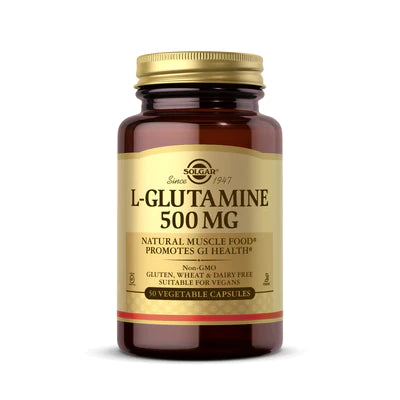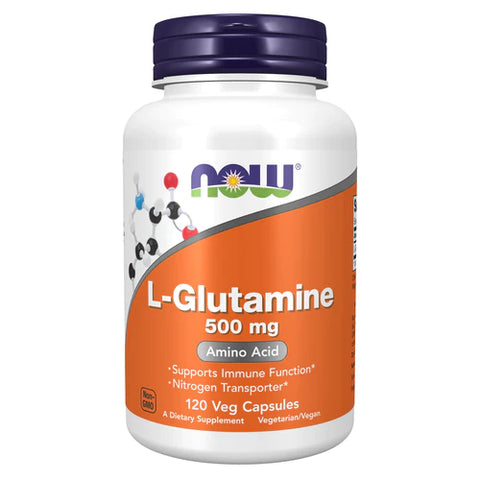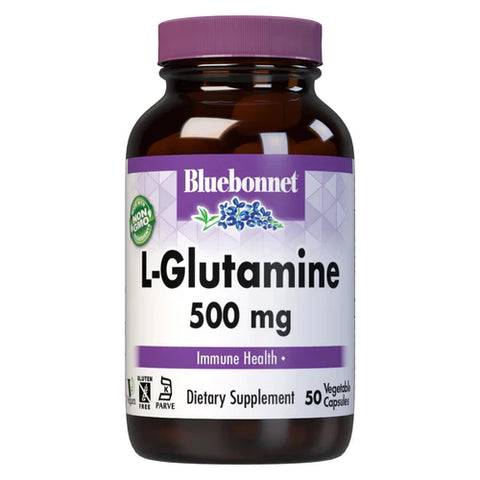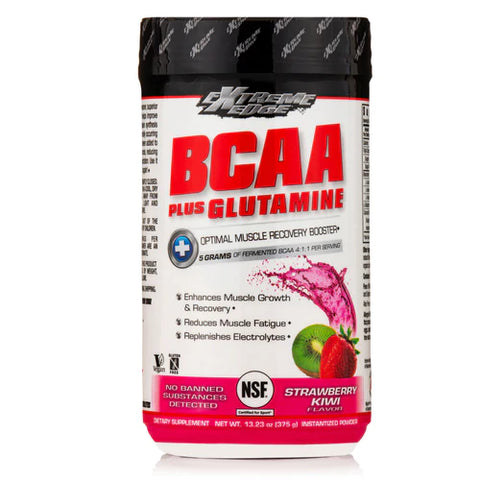Glutamina é um aminoácido encontrado naturalmente no corpo e está envolvido em muitos processos, incluindo a síntese de proteínas e a regulação da função do sistema imunológico. Algumas pesquisas sugeriram que a glutamina pode ter vários benefícios potenciais para os atletas, incluindo auxílio na recuperação muscular, reduzir a dor muscular e apoiar a função do sistema imunológico durante o intenso treinamento.
O que é um suplemento de glutamina?
Os suplementos de glutamina são produtos que contêm altos níveis desse aminoácido e são tomados por via oral, geralmente na forma de cápsulas ou pó. Algumas pessoas tomam suplementos de glutamina para ajudar com condições como desperdício muscular, distúrbios digestivos e deficiências do sistema imunológico. No entanto, existem evidências científicas limitadas para apoiar o uso de suplementos de glutamina para esses fins. É sempre importante falar com um prestador de serviços de saúde antes de tomar qualquer suplemento para determinar se é apropriado e seguro para você.
Dosagem de glutamina para atletas
A glutamina é um aminoácido Isso é importante para a saúde e a função do sistema imunológico, bem como para o funcionamento adequado do intestino. Alguns atletas e fisiculturistas tomam Suplementos de glutamina acreditando que eles podem ajudar a melhorar o desempenho do exercício e o crescimento muscular. No entanto, existem evidências científicas limitadas para apoiar esses usos da glutamina.
Produto recomendado:
A dosagem recomendada de glutamina para atletas varia dependendo da marca e forma específicas do suplemento. Algumas faixas de dosagem comuns são:
- Pó: 5-15 gramas por dia
- Cápsulas: 500-2.000 miligramas por dia
Glutamina para atletas de resistência
Há evidências científicas limitadas para apoiar o uso de suplementos de glutamina para atletas de resistência. Alguns estudos sugeriram que a suplementação de glutamina pode ajudar a melhorar desempenho do exercício e reduzir os danos musculares em atletas de resistência, mas os resultados foram misturados e são necessárias mais pesquisas para confirmar esses efeitos.
Também é importante observar que as lojas de glutamina do corpo podem ser reabastecidas através de uma dieta bem equilibrada que inclui proteínas adequadas. É improvável que os atletas de resistência que consomem proteínas suficientes em sua dieta tenham uma deficiência de glutamina e podem não precisar tomar um suplemento.
Se você é um atleta de resistência, considerando tomar um Suplemento de glutamina, é uma boa ideia conversar com um provedor de assistência médica ou nutricionista esportivo primeiro. Eles podem ajudá -lo a determinar se um suplemento é necessário e aconselhá -lo sobre a dose e o tempo apropriados da suplementação.
Produto recomendado:
Pó de glutamina da natureza superior
Algumas pessoas tomam suplementos de glutamina, como a natureza superior Glutamina pó, Para ajudar com condições como desperdício muscular, distúrbios digestivos e deficiências do sistema imunológico. No entanto, existem evidências científicas limitadas para apoiar o uso de suplementos de glutamina para esses fins. É sempre importante falar com um prestador de serviços de saúde antes de tomar qualquer suplemento para determinar se é apropriado e seguro para você.
Produto recomendado:
Diferença entre L glutamina e glutamina
L-glutamina e a glutamina são o mesmo composto. A L-glutamina é a forma que ocorre naturalmente da glutamina de aminoácidos, que é um dos 20 aminoácidos que compõem proteínas no corpo.
O "L" em L-glutamina refere-se à configuração específica da molécula, que é um dos vários isômeros possíveis (variações estruturais) da glutamina. A L-glutamina é a forma mais comum e biologicamente ativa do aminoácido e é a forma encontrada nos suplementos alimentares e no corpo.
Portanto, não há diferença entre L-glutamina e glutamina. Eles são simplesmente nomes diferentes para o mesmo composto.
Produto recomendado:
Benefícios de glutamina para atletas
Algumas pesquisas sugeriram que a glutamina pode ter vários benefícios potenciais para os atletas, incluindo:
- Aunhores pela recuperação muscular: Alguns estudos sugeriram que a suplementação de glutamina pode ajudar a reduzir a dor muscular e melhorar a recuperação muscular após exercícios intensos.
- Reduzindo a dor muscular: Algumas pesquisas descobriram que a suplementação de glutamina pode reduzir a dor muscular após exercícios intensos.
- Suportando a função do sistema imunológico: A atividade física intensa pode colocar muito estresse no sistema imunológico, e algumas pesquisas sugeriram que a suplementação de glutamina pode ajudar a apoiar a função do sistema imunológico durante períodos de treinamento intenso.




